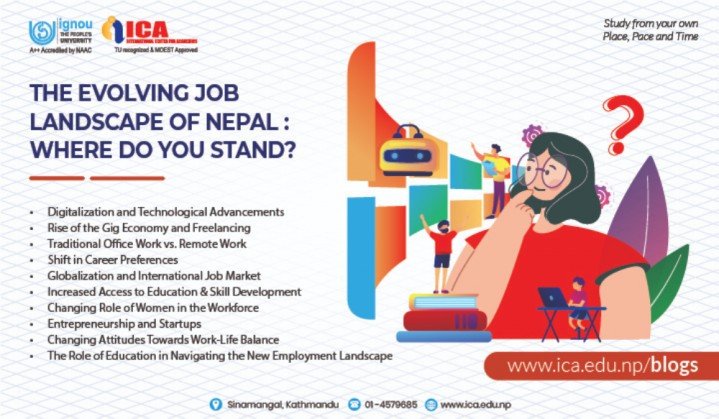
The Evolving Job Landscape of Nepal: Where Do You Stand?
The employment landscape in Nepal is undergoing significant transformation, driven by a confluence of technological advancements, evolving market dynamics, and the shifting aspirations of the workforce. As the nation embraces a more digital and interconnected world, traditional job roles are evolving, and new opportunities are emerging, particularly for those equipped with modern skills and a forward-thinking mindset. This shift presents both challenges and opportunities, especially for those seeking to build sustainable careers in this rapidly changing environment.
This blog highlights the major areas of change in job and employment perspective in Nepal over the past decade and the major differences observed.
Digitalization and Technological Advancements
A decade ago, traditional jobs in sectors like agriculture, government, and teaching were predominant in Nepal. The IT sector was still emerging, with limited opportunities primarily in urban areas. However, digitalization has transformed the job market in recent times. There is a growing demand for IT professionals, including software developers, data analysts, and cybersecurity experts. The rise of e-commerce, fintech, and digital marketing has created new career paths, particularly for younger generations. Sectors like information technology, digital media, and online services are expanding rapidly, offering a range of opportunities for skilled professionals.
Rise of the Gig Economy and Freelancing
Previously, most people preferred stable, long-term employment, often with government or large organizations. Freelancing was not a widely recognized or viable career option. Presently, the gig economy has grown significantly, with more professionals opting for freelance work in fields like graphic design, content creation, and IT. Online platforms like Upwork and Fiverr have enabled Nepalese workers to tap into global markets, offering services remotely.
Traditional Office Work vs. Remote Work
There has been a noticeable shift in office operation practices with a visible inclination towards remote work practices. Almost all industries have adapted to this changing trend to some extent. Unlike before, remote work trends are not just limited to the Information Technology (IT) sector today. Whether it be healthcare, business, finance, entertainment, or education, all sectors are adopting the new remote work trends. The flexible working hours, cost reduction, increased productivity, and a larger focus on work done instead of hours spent in the office have been the biggest contributors to this change.
Shift in Career Preferences
About 10 years ago in Nepal, one of the most popular job choices was working in the government sector. Government jobs were highly sought after due to the job security, benefits, and social status they provided. Many people aimed to become civil servants, teachers, or work in other public sector roles. Additionally, careers in medicine, engineering, and agriculture were also considered the most prestigious and sought-after, with a heavy focus on job security. While traditional careers are still respected today, there is a noticeable shift towards entrepreneurship, startups, and tech-related jobs. Many young people are more interested in innovation, flexibility, and opportunities for growth rather than just stability.
Globalization and the International Job Market
If we look specifically at the employment opportunities preferences in past years, the focus was largely on domestic employment, with many Nepalese seeking work abroad primarily in Gulf countries as migrant laborers. However, globalization has opened up new opportunities for Nepalese workers to engage in the international job market, not just as migrant laborers but also as skilled professionals in fields like IT, finance, and education. There is also an increasing trend of remote work for international companies.
Increased Access to Education and Skill Development
Access to quality education and specialized training was limited during previous years, particularly in rural areas. The emphasis was on conventional education pathways like degrees in medicine, engineering, and law. Now, there has been an expansion in educational opportunities, with the growth of online learning platforms offering courses in a wide range of subjects, including IT, management, and creative fields. This has enabled more people to gain the skills needed for modern job roles without having to pursue long-term degree education with full-time involvement.
Changing Role of Women in the Workforce
Women's participation in the workforce was relatively lower than today, with social norms often limiting their opportunities to sectors like education and healthcare. The situation has changed drastically than before, with a significant increase in women entering diverse fields, including entrepreneurship, IT, and management. Initiatives supporting women in business and education have contributed to this shift, though challenges remain.
Entrepreneurship and Startups
Entrepreneurship was not as widely encouraged or supported a few years back. The business environment was more traditional, with family-owned businesses dominating the market. Currently, there is a thriving startup culture in Nepal, particularly in urban areas like Kathmandu. Young entrepreneurs are launching businesses in technology, e-commerce, agriculture, and tourism, supported by incubators, accelerators, and increased access to venture capital.
Changing Attitudes Towards Work-Life Balance
The focus was largely on securing stable employment with little emphasis on work-life balance back then. Long working hours and job security were prioritized over personal time. Now, there is a growing emphasis on work-life balance, flexibility, and job satisfaction. Youths, in particular, are seeking careers that offer flexibility, opportunities for personal growth, and a balance between work and personal life.
The Role of Education in Navigating the New Employment Landscape
In this dynamic environment, the importance of education and skill development cannot be overstated. As the demand for new skills grows, so does the need for accessible, flexible, and relevant educational programs. Online education, in particular, is playing a crucial role in equipping Nepalese workers with the skills needed to thrive in the modern job market.
Institutions like ICA (accredited to IGNOU) offering online diploma, bachelor’s, and master’s degrees in fields like management, IT, and travel and tourism are providing a lifeline for those looking to upskill or change careers. These programs offer the flexibility to learn at one's own pace, place, and time, making higher education more accessible than ever before. For working professionals, housewives, and those with other commitments, online education offers a practical solution to advance their careers without sacrificing their current responsibilities.
For those ready to embrace the future, now is the time to invest in education, build new skills, and prepare for the opportunities that lie ahead. In this new landscape, the future belongs to those who are ready to learn, adapt, and innovate. Choose a program of your choice and ENROLL NOW!
 01- 4579685/ 4583902/ 4578471/ 4591485
01- 4579685/ 4583902/ 4578471/ 4591485 support@ica.edu.np
support@ica.edu.np
 9818505224
9818505224


